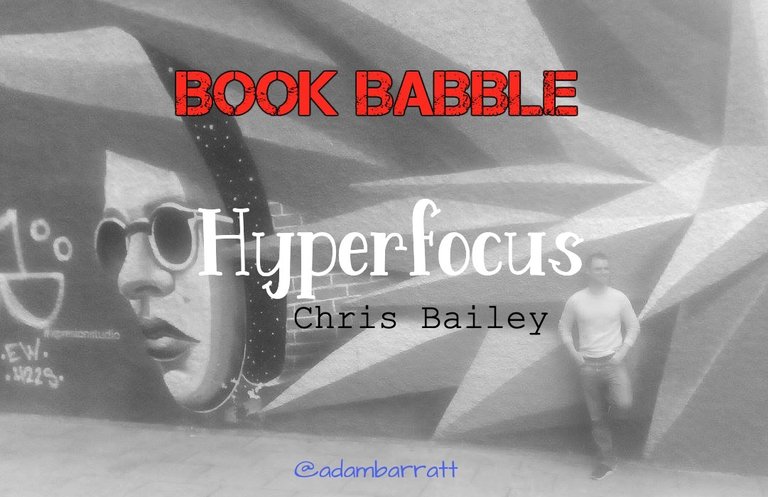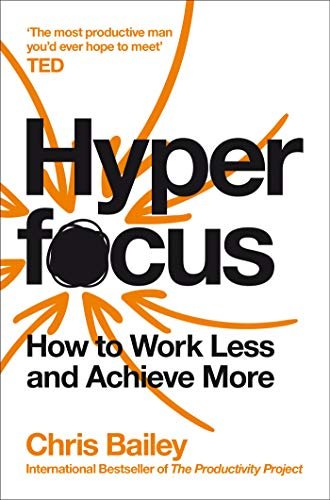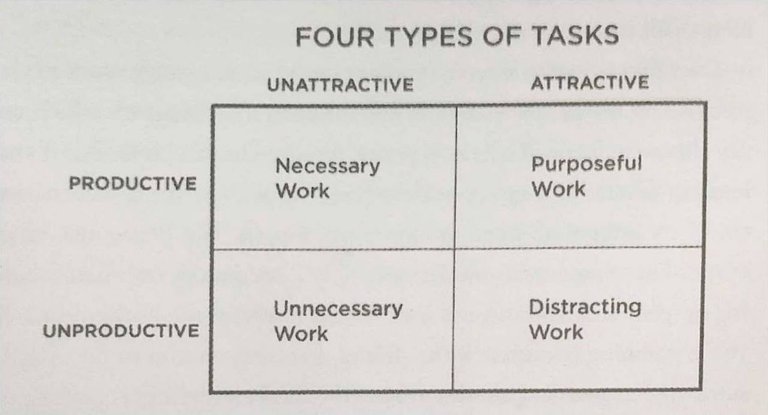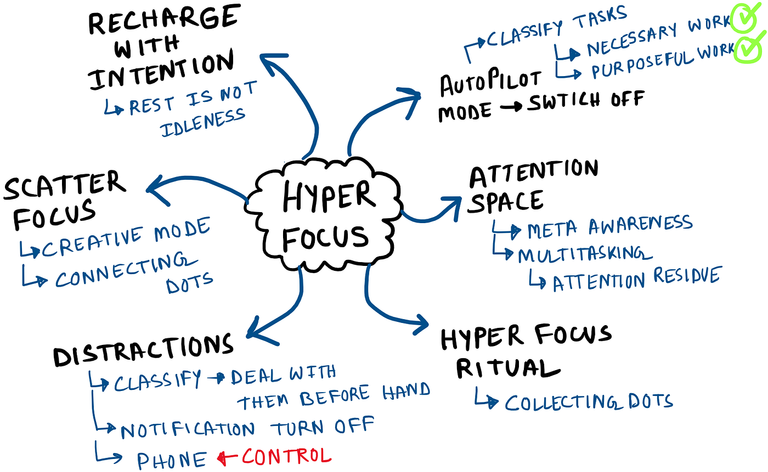"How to work less to achieve more…"

I've just finished this one, so here's a BookBabble straight away whilst it's fresh in the mind! Browsing my Kindle, this was available for 99p (about 75c) so I snapped up the bargain…
Here we're talking all about Hyperfocus; that being as you may surmise, getting ultra focused in all we do. Although that's only really one part of the book. Yes, we have the element of eliminating distractions and really zoning in for a period of time. However, this book is as much as what's termed Scatterfocus as much as its hyper equivalent.
The important point is to really focus and make the most of that time when it is time to do so. And intentionally allow our mind to wander at other times as that brings its own perks as well as feeds in to our hyperfocus time.
Making the most and balancing these 2 states is where it's at…
Top Takes - some highlights from the book followed by my thoughts…
Directing your attention toward the most important object of your choosing—and then sustaining that attention—is the most consequential decision we will make throughout the day. We are what we pay attention to.
We are what we repeatedly do; where focus goes, energy flows etc. It's the basis for all personal development and productivity advice, so we need to get a handle on it before our lives slip away mindlessly as we scroll past all the crap.
There are two main criteria to consider when categorizing what to focus on: whether a task is productive (you accomplish a lot by doing it) and whether a task is attractive (fun to do) or unattractive (boring, frustrating, difficult, etc.).
It's a matter of priorities too. What it important and/or fun? By categorising, we can make a conscious choice, get organised, and execute accordingly.
Necessary work / Unnecessary work / Distracting work / purposeful work
These are the 4 parts of the quadrant and a good way to really see what you're dealing with. They all have their place, but only at certain times and should be used wisely. Necessary and purposeful work will always be the way to go over unnecessary or distracting (but they exist and will be visited at some point).

there’s a finite limit to how many things we can focus on.
This is why we need to be careful and apply our attention wisely. We are literally limited so it's about what we choose to do and how we can make the best impact.
Our lives are generally structured around the fact that we’re able to hold, at most, seven pieces of unique information in our short-term memory.
So 7 bits of info at any given time. You can't have dozens and you're better of focusing on less, but that is what most brains can hold most of the time.
we’re able to multitask surprisingly well with habits.
We've talked in the past about multi-tasking being a myth. That you're really just switching (albeit quickly) between tasks. Here it's suggested that you can multi-task but only certain things can go together (ie. using different parts of the brain) and if there is a habit associated with it so it's automatic.
we work for just forty seconds
Apparently just 40 seconds until we get distracted… wow! We might want to boost that a little ;)
Leroy coined the term “attention residue”
When switching between tasks, there will always be a 'residue' from the previous task (and other things going on in your life). In the back - and even front - of your mind, you are thinking on some level about 'that other thing', so it will affect what you're doing right now.
There was a study which found that when we continually switch between tasks, our work takes 50% longer, compared with doing one task from start to completion.
attentional space.
This is a key part of the book – Attentional Space. What you have room for, what goes in and what goes out.
The most important aspect of hyperfocus is that only one productive or meaningful task consumes your attentional space.
You have to focus on one thing for that period of time. You can do many things eventually but it's that singular focus of your attention that will be the most productive.
Steps to Hyperfocus:
- Choose a productive or meaningful object of attention
- Eliminate as many external and internal distractions as you can
- Focus on that chosen object of attention
- Continually draw your focus back to that one object of attention

intention absolutely has to precede attention.
It can't be haphazard, it needs to be thought and acted on with clarity. There is research that shows that our mind wanders for 47 percent of the day… I mean half the time, can't be a good thing, so we need to be more intentional about our attention.
And it's also said that it takes an average of twenty-two minutes to resume working on a task after we’re distracted or interrupted. Not to mention, we become distracted a second time before getting back to where we were (as in we'll look at something else before returning).
the Rule of 3: at the start of each day, choose the three things you want to have accomplished by day’s end.
Enough to have more than one thing going on and be able to move straight on to something, but not too many that it starts getting overwhelming. There is a lot of power in the number 3 and just fits with a number of things. Not least here, and you can also have 3 professional and 3 personal things, or a mixture is fine.
consider the second- and third-order consequences.
This was touched on in the last BookBabble on Principles by Ray Dalio and here it is again. People tend to only focus on the first order consequences which is just the direct cost. There are many knock on effects that apply down the line and these needs to be considered to make a fully-formed decision.
we switch between computer applications 566 times during the average workday.
Sheesh, I'll just leave that one there.
our brain’s built-in novelty bias
We're always looking for new and stimulating things, so we struggle to knuckle down and crack on with stuff after a period of time or when it becomes boring or difficult.
We need to try and remove every object of attention that’s potentially more stimulating and attractive than what you intend to do, then it gives the brain no choice but to work on that task.
open loops
Our brains hate open loops and insist on them being closed off before it moves on. Hence why we've got so much 'residue' hanging around and crazed minds.
Flow, Mihaly Csikszentmihalyi
Another great book on a similar subject, and of course covered in a previous BookBabble. I think of Hyperfocus as a state before reaching Flow although you are well in that direction. Part of the same spectrum of getting in the zone.
meditation and mindfulness
These two beauties were discussed and are super-important. Some sort of meditation practice is not only desirable but perhaps imperative, and involves always bringing your mind back to a single point of focus. Then mindfulness is staying present and mindful, rather than mindless
Mindfulness differs from hyperfocus in one major respect: it’s about focusing on the circumstances of the present, rather than becoming immersed in them.

While hyperfocus involves directing your attention outward, scatterfocus is about directing it inward, inside your own mind. Just as hyperfocus is the most productive mode of the brain, scatterfocus is the most creative.
This is where we dive into Scatterfocus. If we're intentional and use it in conjunction with Hyperfocus then it's a great asset. It's actually where we allow a lot to flow around our minds, let go and get creative. We join pieces of information together without too much structure. There's freedom there, as opposed to the more intense Hyperfocus mode.
We’re also more likely to focus on anything that’s pleasurable or threatening.
We're always looking for the fun and easy option, as well as anything that may be of danger and could hurt or kill us. Our brains are still wired from the good ol' days of there being potential threats to life around every corner. Although these don't exist so much, our brain is still scanning and warning us. Much to our detriment at times.
Immersing yourself in a setting that contains potential insight triggers is a powerful practice. A rich environment is one where you’re constantly encountering new people, ideas, and sights.
A lot is down to environment, and the more stimulation and 'stuff' happening, the more your brain has to work with. There are times when this is great as it gives it more material, and others where it may be a bit much. Strategically being in the right environments at a given time will produce the best results.
Einstein worked to attain his genius. As he put it, “I have no special talents, I am only passionately curious.”
And most 'geniuses' are that way more because of how much practice they've had at such a young age. There may be inherent talent, but sheer volume of hours and deliberate practice will make someone amazing at a particular thing. Einstein would have made his first 10,000 hours by the age of eight.
The more creativity your job requires, the more often you should scatter your attention.
It's all about balance and the right thing for the situation. As Scatterfocus is more creative, it makes sense that the creative pursuits should have more of this time.
When we focus, we consume and collect dots; when we scatter our attention, we connect these dots.
Dot collecting! The dots in this sense are pieces of information and how and where they're collected, connected and used.
Hyperfocusing allows us to remember more, which leads to more valuable connections made in scatterfocus mode. Scatterfocus lets us recharge, which in turn provides more energy to hyperfocus.
Again, how the 2 work in tandem. It's not just - as the title of the book suggests - becoming really focused, but rather having the scatter time and bringing them together.
Alcohol and caffeine
Be strategic about these little beasts. They have their place and can be used to your advantage, but of course approach with care. Caffeine will give you a boost when you need that kick and want to get down to business (Hyperfocus). Alcohol may well help with Scatterfocus as your inhibitions will be reduced and your mind can wander with freedom… may affect performance though ;)
Video review by Productivity Game on YouTube
Thanks Chris! Anything Else?
Solid book, not too long (but long enough, just doesn't drone on unnecessarily). I was aware of the book, and as I say, with the deal on the Kindle I had to snap it up. The whole area is so important and it's great to get another angle on this stuff.
Yes, it's all been said before, and will be so again. There's not too much new here if you read much of this material (although still worthwhile I'd say), and could be a revelation if you haven't.
There's plenty on Hyperfocus as you'd expect, but surprisingly (perhaps) there was as much - if not more (or maybe it seemed that way as it was the second half) - about Scatterfocus. Really being intentional and dialing that in. The takeaway would be to get these 2 working in tandem and at their optimum. Then you're all set!
Deep Work (by Cal Newport), Flow and others cover some of this stuff and we can't really get enough… by which I mean applying these things and getting into these states, not just reading about them. The more we can, the more (and better) we can produce!
First image my own, other images and video linked to source
- 1-50: First 50 BookBabbles
- 51: THE DAILY STOIC - Ryan Holiday
- 52: MAKE TIME - Jake Knapp & John Zeratsky
- 53: GRIT - Angela Duckworth
- 54: WHAT I TALK ABOUT WHEN I TALK ABOUT RUNNING - Haruki Murakami
- 55: THE PURSUIT OF PERFECT - Tal Ben-Shahar
- 56: THE SLIGHT EDGE - Jeff Olson
- 57: CONTAGIOUS - Jonah Berger
- 58: THE RICHEST MAN IN BABYLON - George S. Clason
- 59: THE 5 AM CLUB - Robin Sharma
- 60: THINK LIKE DA VINCI - Michael Gelb
- 61: INFLUENCE - Robert Cialdini
- 62: THE ONE THING - Gary Keller
- 63: THE 12 WEEK YEAR - Brian Moran & Michael Lennington
- 64: THE POWER OF YOUR SUBCONSCIOUS MIND - Joseph Murphy
- 65: THE UNTETHERED SOUL - Michael A. Singer
- 66: ON WRITING WELL - William Zinsser
- 67: PRINCIPLES - Ray Dalio
Posted Using InLeo Alpha
I definitely need to read this. I get distracted too easily. Both inward and outward 😂
A very nice review you've written by the way
Thanks! Yes, we could all do with getting more focused ;)
What a complete review! What you mention about the importance of intentionally directing our attention resonates so much; sometimes we get carried away with distractions and lose focus on what really matters. Great input, cheers! 💪
Thanks! Yes, super important for us all
Congratulations @adambarratt! You have completed the following achievement on the Hive blockchain And have been rewarded with New badge(s)
<table><tr><td><img src="https://images.hive.blog/60x70/https://hivebuzz.me/@adambarratt/comments.png?202408301706" /><td>You made more than 8000 comments.<br />Your next target is to reach 8500 comments. <p dir="auto"><sub><em>You can view your badges on <a href="https://hivebuzz.me/@adambarratt" target="_blank" rel="noreferrer noopener" title="This link will take you away from hive.blog" class="external_link">your board and compare yourself to others in the <a href="https://hivebuzz.me/ranking" target="_blank" rel="noreferrer noopener" title="This link will take you away from hive.blog" class="external_link">Ranking<br /> <sub><em>If you no longer want to receive notifications, reply to this comment with the word <code>STOP <p dir="auto"><strong>Check out our last posts: <table><tr><td><a href="/hive-122221/@hivebuzz/pud-202409"><img src="https://images.hive.blog/64x128/https://i.imgur.com/805FIIt.jpg" /><td><a href="/hive-122221/@hivebuzz/pud-202409">Hive Power Up Day - September 1st 2024